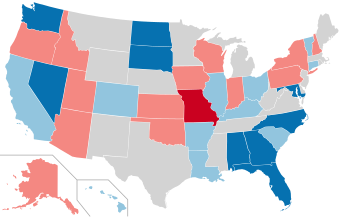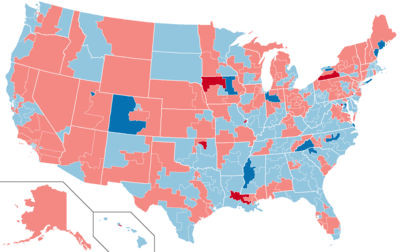| ←
1984
1985 1986
1987
1988 → Midterm elections | |
| Election day | November 4 |
|---|---|
| Incumbent president | Ronald Reagan (Republican) |
| Next Congress | 100th |
| Senate elections | |
| Overall control | Democratic gain |
| Seats contested | 35 of 100 seats (34 Class 3 seats + 1 special election) |
| Net seat change | Democratic +8 |
 | |
| 1986 Senate election results
Democratic gain Democratic hold | |
| House elections | |
| Overall control | Democratic hold |
| Seats contested | All 435 voting seats |
| Popular vote margin | Democratic +9.9% |
| Net seat change | Democratic +5 |
 | |
| 1986 House of Representatives election results
Democratic gain Democratic hold | |
| Gubernatorial elections | |
| Seats contested | 38 (36 states, 2 territories) |
| Net seat change | Republican +8 |
 | |
| 1986 gubernatorial election results Territorial races not shown Republican hold
Republican gain
Democratic hold
Democratic gain | |
The 1986 United States elections were held on November 4 and elected the members of the 100th United States Congress. The elections occurred in the middle of Republican President Ronald Reagan's second term. Democrats regained unified control of both chambers of Congress for the first time since the 1980 elections.
In an instance of the six-year itch phenomenon, the Democrats won a net gain of eight seats to recapture control of the United States Senate, taking back the chamber for the first time since the 1980 elections. Democrats won the national popular vote for the House of Representatives by a margin of 7.7 percentage points, making a net gain of five seats. [1] Despite Democratic congressional gains, in the gubernatorial elections, the Republican Party picked up a net of eight governorships, making 1986 the last midterm election until 2022 that the president's party made gubernatorial gains.
The national campaign centered largely around the Senate, where Republicans defended a large freshman class of Senators. Despite sweeping Democratic gains, many of the losing Republicans incumbents lost by small margins. The Republican loss of the Senate put an effective check on any further major conservative legislation during the Reagan administration. The elections also had a major impact on the Supreme Court, as Republican losses helped ensure that Robert Bork's nomination to the Supreme Court would be defeated by the Senate. After the Senate rejected the conservative Bork, Reagan instead nominated Anthony Kennedy, who became a critical swing vote on the court. [2]
See also
- 1986 United States House of Representatives elections
- 1986 United States Senate election
- 1986 United States gubernatorial elections
References
- ^ "Statistics of the Congressional Election of November 4, 1986" (PDF). U.S. House of Reps, Office of the Clerk. Retrieved 10 April 2017.
- ^ Busch, Andrew (1999). Horses in Midstream. University of Pittsburgh Press. pp. 126–135.